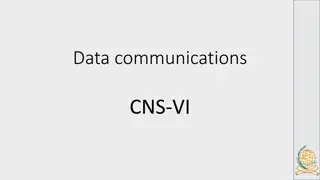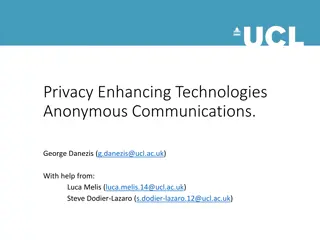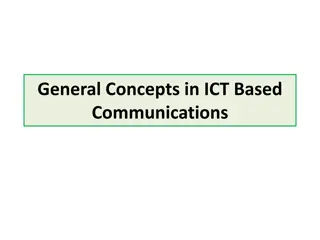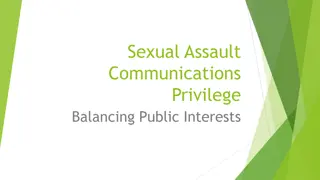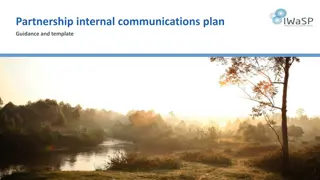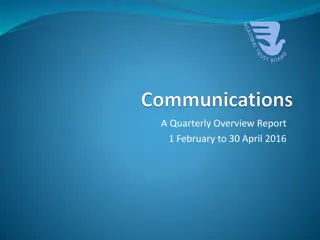Mastering Effective Business Communications: Key Concepts and Challenges
Explore the essential concepts of business communications, including denotation, connotations, euphemisms, and perception of reality. Gain insights into the nuances of communication and how misinterpretations can arise. Enhance your understanding of language usage to communicate more effectively in a business context.
Download Presentation

Please find below an Image/Link to download the presentation.
The content on the website is provided AS IS for your information and personal use only. It may not be sold, licensed, or shared on other websites without obtaining consent from the author. Download presentation by click this link. If you encounter any issues during the download, it is possible that the publisher has removed the file from their server.
E N D
Presentation Transcript
Effective Business Communications Dr. Adeel Nasir
CONCEPTS AND PROBLEMS OF COMMUNICATION Convention of meaning Perception of reality Value attitude and options
Reactions to Denotations, Connotations and Euphemisms There are situations where sender of the message do not consider the probable interpretations and reactions of receiver Due to this miscommunication occurs, because words has both denotative and connotative meanings Joke can be misinterpreted as insult,
Denotation It is usually a dictionary definition of a word Denotative meaning inform the receiver, name, object, people and event without indicating positive or negative qualities. E.g. car, desk, book, house and water It is imperative for sender and receiver to have same language and similar understanding of the context.
Connotations Connotative meaning enhance qualitative judgments and personal reactions. e.g. house has a denotative meaning but villas, home, cottage, firetrap they all represent the place of residence but has connotative meanings. The word student has a denotative meaning but bookworm, Scholar, dropout are connotative They represent how sender evaluate the subject Some words such as efficient, gentle, prompt has favorable connotations Other such as lazy, cowardly, rotten has unfavorable connotations. Some words has positive connotation in one context and negative in another The word cheap material has negative connotation and cheap price has positive connotations To communicate effectively you should know the connotative meaning of your words
Euphemism a word or phrase used to avoid saying an unpleasant or offensive word "Senior citizen" is a euphemism for "old person"
Perception of reality Each human sensory perceptions (i.e. touch, sight, hearing, smell, and taste) are limited and each person mental filter are unique. Complex, infinite and continues changing the material world provides a special reality to each individual. We make various abstractions, inferences and evaluations of the world around us.
Perception of reality Communication Problem with Perception of Reality Abstracting: When you focus on some details and omit others Necessary and Desirable abstracts: Due to limited time, space, expense and purpose you select only those facts which are pertinent to your purpose and omit the rest E.g. how you describe yourself in one page application Problem with abstracting is that differences occur not only when person describe events but also when they describe people, equipment, project and animals etc. Slanted Statements Slanting is unfair in factual reporting. A person should determine that the fact they are acquainted with fully represents the whole E.g. A news reporter should not write A small group of change seekers listen to the address of governor but the writeup might state between 250 to 350 people heard the address of governor. Not only the language you use but also the type of information you include and exclude can result in slanting, revealing your personal biases
Perception of reality Communication Problem with Perception of Reality Inferring: Conclusions made by reasoning from evidence or premises are called inferences. We make assumptions and draw conclusions even though we are not able to immediately verify the evidence. Necessary, desirable inferences for business and professional people, inferences are essential in analyzing, solving problems and planning procedures. They draw desirable inferences after collecting as much factual data as possible. After analyzing various subjects Doctors draw inferences regarding the symptoms of a decease for public information.
Perception of reality Communication Problem with Perception of Reality Inferring: Risk of inferences Inferences may be incorrect or unreliable anticipate the risks before acting on drawn inferences In a report, a writer should mention all the assumptions before presenting his or her inferences. One should distinguish clearly among inferences based on facts and mere guesstimates.
Values, Attitudes and opinions Communication effectiveness depends on the values, attitudes and options that communicators have in the mantle filters. A receiver attitude towards a message can determine whether it is accepted, rejected, distorted or avoided. Communication problems involving values attitudes and opinions Favorable or unfavorable information For effective communication occasionally sender emphasizes on the information that receivers found as beneficial or favorable. Receiver often react to unfavorable information by rejecting, distorting and avoiding it.
Values, Attitudes and opinions Communication problems involving values attitudes and opinions Inadequate or incorrect information Occasionally people react according to their attitudes toward a situation rather than to the facts. E.g. customer went into the shop assuming vast discounts on goods because she saw 70% discount chart outside. She got angry of the fact that no product in the shop was at 70% discount because it was not flat but upto 70%. Close Minds Some people do not consider facts and additional information because they hold rigid views regarding certain subjects. Senders Credibility Credibility in the sender is important to gain the favorable reaction from receiver E.g. person from X political party can communicate effective with the person from the same party. But may not get favorable response from Y political party worker.






